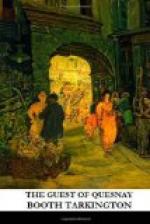“Thank you, George,” I said gratefully. “I hope you’ll point out the Louvre and the Eiffel Tower to me some day. I didn’t mean Mariana.”
“What did you mean?”
What I had meant was so obvious that I turned to my friend in surprise. He was nervously tapping his chin with the handle of his cane and staring at the white automobile with very grim interest.
“I meant the man with her,” I said.
“Oh!” He laughed sourly. “That carrion?”
“You seem to be an acquaintance.”
“Everybody on the boulevard knows who he is,” said Ward curtly, paused, and laughed again with very little mirth. “So do you,” he continued; “and as for my acquaintance with him—yes, I had once the distinction of being his rival in a small way, a way so small, in fact, that it ended in his becoming a connection of mine by marriage. He’s Larrabee Harman.”
That was a name somewhat familiar to readers of American newspapers even before its bearer was fairly out of college. The publicity it then attained (partly due to young Harman’s conspicuous wealth) attached to some youthful exploits not without a certain wild humour. But frolic degenerated into brawl and debauch: what had been scrapes for the boy became scandals for the man; and he gathered a more and more unsavoury reputation until its like was not to be found outside a penitentiary. The crux of his career in his own country was reached during a midnight quarrel in Chicago when he shot a negro gambler. After that, the negro having recovered and the matter being somehow arranged so that the prosecution was dropped, Harman’s wife left him, and the papers recorded her application for a divorce. She was George Ward’s second cousin, the daughter of a Baltimore clergyman; a belle in a season and town of belles, and a delightful, headstrong creature, from all accounts. She had made a runaway match of it with Harman three years before, their affair having been earnestly opposed by all her relatives—especially by poor George, who came over to Paris just after the wedding in a miserable frame of mind.
The Chicago exploit was by no means the end of Harman’s notoriety. Evading an effort (on the part of an aunt, I believe) to get him locked up safely in a “sanitarium,” he began a trip round the world with an orgy which continued from San Francisco to Bangkok, where, in the company of some congenial fellow travellers, he interfered in a native ceremonial with the result that one of his companions was drowned. Proceeding, he was reported to be in serious trouble at Constantinople, the result of an inquisitiveness little appreciated by Orientals. The State Department, bestirring itself, saved him from a very real peril, and he continued his journey. In Rome he was rescued with difficulty from a street mob that unreasonably refused to accept intoxication as an excuse for his riding down a child on his way to the hunt. Later, during the winter just past, we had been hearing from Monte Carlo of his disastrous plunges at that most imbecile of all games, roulette.




